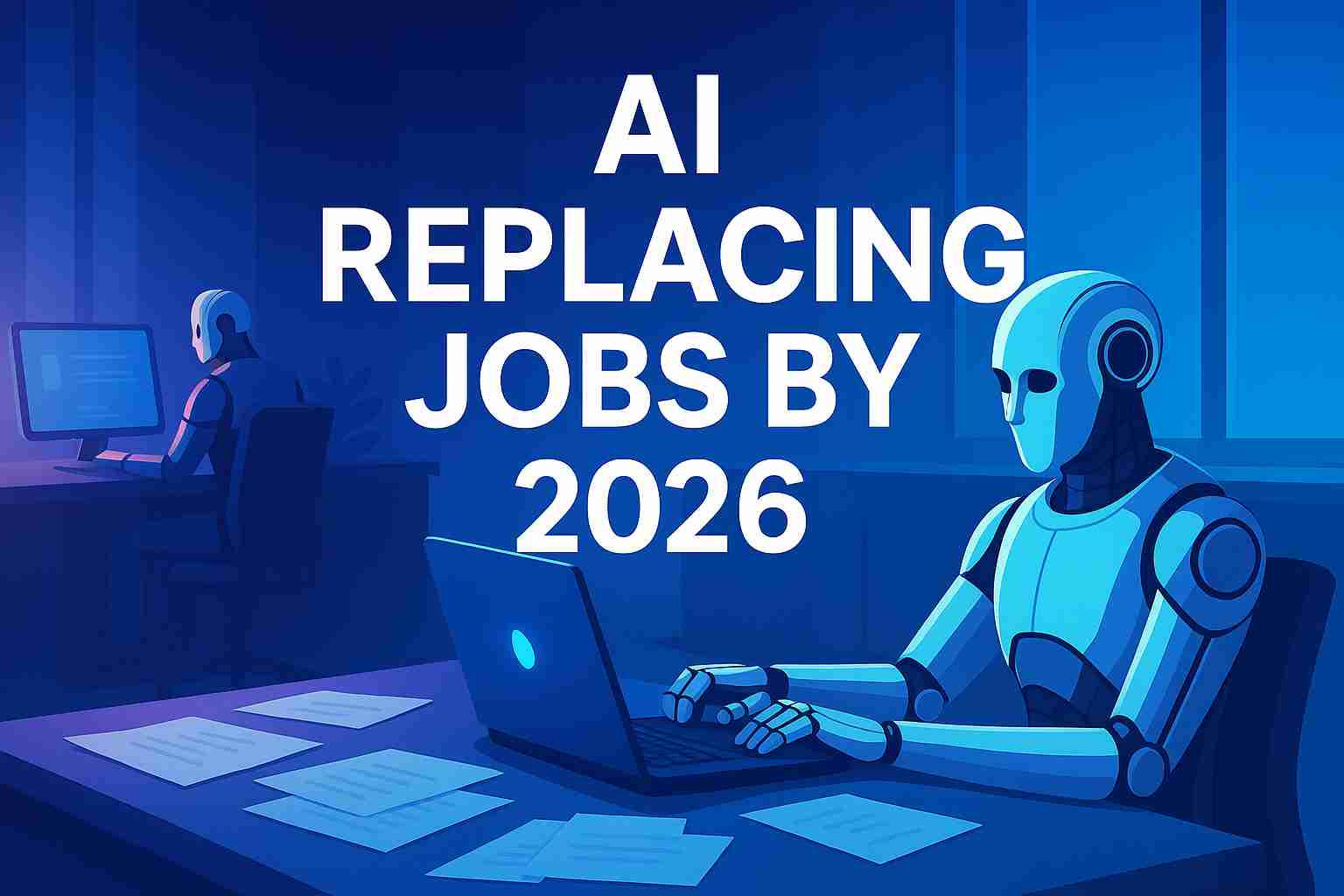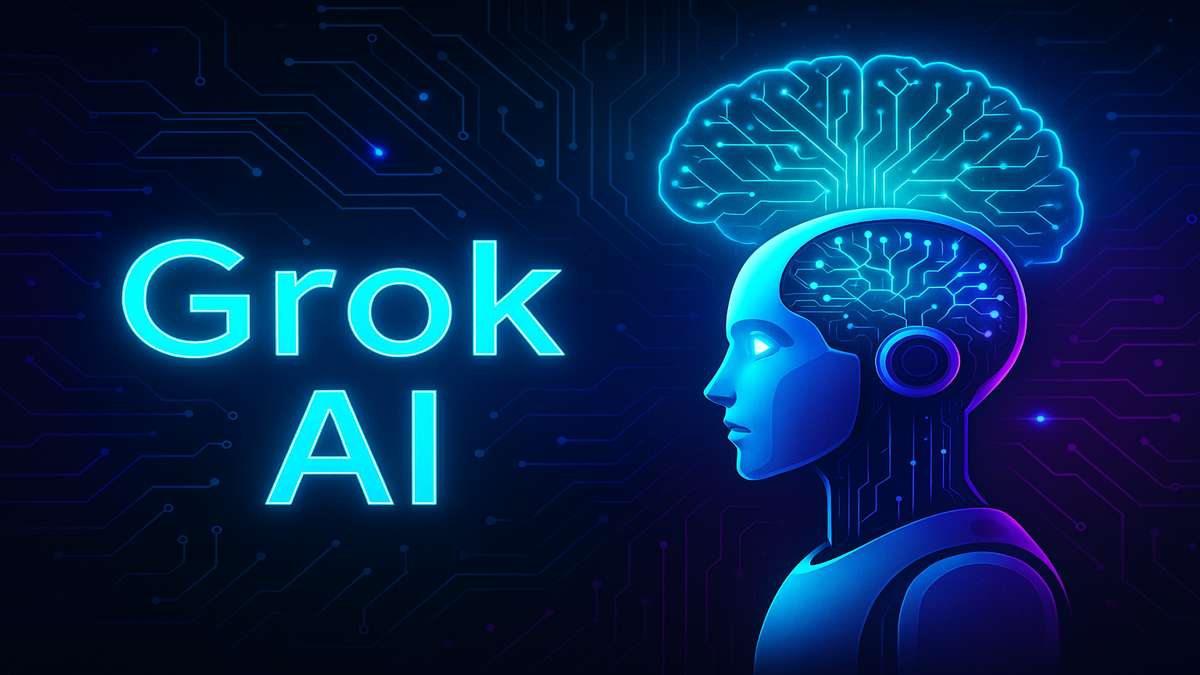The emergence of artificial intelligence and its capabilities are no longer solely buzzwords — they have become a driving force rewriting the future of work. Chatbots replacing customer service agents, AI that can generate articles, as well as write code – the reality is here: AI replacing jobs at a far quicker pace than most acknowledge.
As we move through 2026, this is a force that is only accelerating and can have potential impacts and ramifications for millions of people and families around the world. The question is no longer if it is going disrupt your career- it is when, and in what capacity. In this article, we will uncover what is happening to society, which jobs are more at risk of being affected, which careers are still safe (for now), and then identify how you can prepare for not just surviving, but thriving in the world of automation.
🤖 Why is AI Replacing Jobs Fast?
Artificial Intelligence, particularly machine learning and generative AI, has already become adopted under the lens of almost every industry. Companies seek to utilize AI because it is:
- Faster than any human intervention
- Cheaper in the long run
- Always available (24/7)
- Able to learn and elevate itself through time
AI applications like ChatGPT, Jasper AI, Midjourney, and GitHub Copilot are already helping (or replacing) humans in writing, designing, developing, and coding.
Corporations are automating tasks that are repetitive beyond factories; our lives in offices, media, finance, and healthcare are all being influenced by AI. AI has the ability to not just follow orders— it makes decisions.
📉 The Jobs Most at Risk by 2026
AI replacing jobs is no longer a future prediction — it’s already taking place. By 2026, several industries in both blue- and white-collar economies are poised to experience huge disruption. McKinsey estimates that as much as 400 million jobs worldwide could be displaced by AI automation through 2030 — and it has already started.
The following are the job categories most vulnerable to AI replacing jobs as the trend spreads all over the world:
🛍️ Retail and Service Worker
AI replacing jobs in retail via self-checkouts, robots stocking self-shelves, and even artificial intelligence customer service agents. Sales clerks, cashiers, and support agents are rapidly finding their roles diminished.
📑 Data Entry and Admin Roles
AI taking over data entry and admin jobs is gaining speed across sectors. With the capacity to extract, process, and arrange huge volumes of data in an instant, AI software is putting an end to the need for manual bookkeeping. Consequently, mundane administrative work is some of the first to get automated in 2026 and beyond.
🧾Accounting & Finance
The finance industry is also witnessing AI take away jobs at a frenzied rate. Accounting software now reviews financial statements, identifies patterns of fraud, and even calculates tax — all without any human intervention. These accounting positions that were once deemed secure are now being streamlined or even completely replaced by AI platforms.
✍️ Content Writers & Designers
Creative professionals are not exempt from automation. Jasper AI, Canva AI, and Midjourney are already automating jobs in content writing and graphic design. These tools can produce blogs, emails, videos, and visuals in a matter of seconds — threatening entry-level content creators seriously as AI continues to replace creative jobs in 2026.
👨💻 Entry-Level Programmers
Even software development is feeling the disruption, as AI is taking on jobs at the junior programming level. Tools such as GitHub Copilot and Google Gemini are now capable of writing and debugging code, recommending optimizations, and finishing repetitive coding tasks. Many entry-level developer roles are now less applicable in an AI-based development scenario.
🧠 What Jobs are Safest From AI?
AI replacing jobs is a global trend for all professions, but not all professions are equally at risk. Even with its considerable prowess, AI lacks the emotional intelligence, human creativity and ethical reasoning to replace certain careers completely — thus, some professions may be more secure in the future where AI reigns supreme. Here are five types of jobs AI almost certainly will not be taking over anytime soon:
🧠 Mental Health Professionals: Therapy, counselling, and coaching involve social and emotional intelligence and emotional connections, making it impossible for AI to replace these professions.
🎨 Creative Strategists: AI can assist with some content, but it cannot replace the human function of storytelling, originality, and instinct.
🔧 Skilled Trades: AI cannot physically perform a service, like plumbing, electrical work, or fixing something mechanical. Skilled trades are one of the last true human options.
📚 Educators and Guidance Leaders: Conveying information, mentoring students or training teams requires emotional salvation and the ability to adapt to students or human behaviour.
🤖 AI Trainers and Ethics Practitioners: Once again ironically as AI technology evolves and advances, the human component is needed to train AI, monitor its activity, and make it ethical.
💡 The best way to survive in an AI world is to work together with it and not against it. Those able to adapt and co-create alongside AI will be the only ones relevant in the future.
🚀 How to Future-Proof Your Career?
Feeling anxious about AI replacing jobs in your industry? You’re not the only one — but the good news is, you can prepare, reskill, and get AI-ready.
These are 5 proven ways to safeguard and develop your career:
Master AI Tools: Leverage tools such as ChatGPT, Jasper, Notion AI, and Surfer AI to boost your productivity. Welcome AI as your collaborator.
Develop Hybrid Competencies: Blend your soft skills such as empathy, communication, and leadership with AI-backed workflows to remain competitive.
Keep Up with AI Job Trends: Keep yourself informed about which jobs are increasing with AI (such as prompt engineering) and which are shrinking.
Enhance Personal Branding: Establish a powerful digital presence that highlights your flexibility and AI proficiency.
❤️ Think Human: Emphasize strengths AI will never match — critical thinking, empathy, strategic decision-making, and storytelling.
When AI replacing jobs is inevitable in the future, the most intelligent thing to do is not try to combat it — but adapt with it.
According to McKinsey’s Future of Work report, over 400 million jobs could be automated by 2030 due to AI replacing jobs globally.
🧠 Final Thoughts
The emergence of artificial intelligence is not merely a fantastical idea — it is changing how we work right now. Although the notion of AI replacing jobs is concerning, it also leads to change. Jobs dependent solely on rote tasks are disappearing; however, jobs that involve flexibility, creativity, and empathy are only growing.
Instead of competing with AI, we should be collaborating with it by understanding how AI operates, constantly improving our own skill set, and defining ourselves as people that can use technology to solve problems – not simply be taken over by it.
The future is not about machines – it’s about people that can work next to them.
👉 Explore more tech and science updates at Science Pulses.
🤖 Frequently Asked Questions about AI Replacing Jobs
1. Will AI completely replace human jobs by 2026?
Not entirely. While AI is replacing jobs in routine and repetitive fields, human roles that require emotional intelligence, ethical reasoning, and creativity will continue to thrive. The future will favor those who collaborate with AI, not compete against it.
2. What jobs are most at risk of being replaced by AI?
Jobs involving repetitive tasks like data entry, customer support, content creation, and basic coding are at the highest risk. AI replacing jobs in these sectors is already underway in 2025 and accelerating rapidly.
3. How can I protect my career from AI disruption?
To stay ahead, learn how to use AI tools like ChatGPT, Jasper, and Canva AI. Build hybrid skills that combine technical knowledge with creativity and communication. The key to survival is adaptability.
4. Are there any jobs safe from AI in the future?
Yes. Roles such as therapists, teachers, electricians, leaders, and AI trainers are safer from automation. These require empathy, trust, hands-on work, and strategic thinking — things AI can’t fully replicate.
5. Can AI help me grow my career instead of replacing it?
Absolutely. If used wisely, AI tools can enhance your productivity and creativity. In fact, learning how AI is replacing jobs can help you pivot into new, high-demand tech roles that involve managing, prompting, or training AI itself.




